Understanding market trends is more important than ever before. New customer expectations, new competition and new technologies are fueling growth opportunities for businesses. The electrical industry is at an important crossroad—member companies are required to transform how they market, sell and service products.
EFC’s Research program offers industry-specific insight on trends impacting the market—and how member companies can best prepare for the onset of new opportunities. Whether it’s understanding changes to customer purchasing habits, how to become a best-in-class organization to attract and retain talent, or how new technology will impact your product and service offerings—EFC’s comprehensive research library has the information you need to drive your business forward.
Featured Research Report: 2023 Research - Decarbonizing Canada via ‘Electrification’
Research Report Prepared for Electro-Federation Canada
“Canada has committed to a net-zero economy by 2050, which will help the country not only reduce its greenhouse gas emissions but also take advantage of the economic opportunities presented by the energy transition.” Business leaders everywhere are planning critical next steps strategically focusing on sustainability. The electrical and automation industry includes technology, innovation experts, and supply chain partners to make the net-zero economy a reality. The electrical and automation industries are powering a changing world.
Download the Full Pembina Institute Report and EFC Key Highlights. View the video recording.
-
Point of Sale Initiative (NEMRA, 2014)
In 2014, members of NEMRA and the NMG (NEMRA Manufacturers Group) commissioned a study to understand the current state of POS. This initiative was an effort to identify how the POS process could be improved to ensure reps were accurately compensated. Today, almost 40 manufacturers and almost 500 distributor locations have endorsed the standards.
Sales Compensation Study (NEMRA)
Which types of compensation plans fuel sales growth and help motivate and retain your sellers? This study focuses on current compensation practices (e.g., pay philosophy, pay rates, pay mix, plan types and mechanics) current pain points, and concludes with recommendations on compensation plan structures. View high-level findings from this study.
For a copy of this report, contact nemra@nemra.org
Pathfinder Report (EFC & Kerrwil)
This annual report features a comprehensive analysis of the entire Canadian electrical channel by providing data on sales, employees, branches, customer mix, product mix and market mix for the following distribution segments:
- Full-line Electrical
- Automation & Control
- Wire & Cable
- Lighting Hybrid
- Utility
- Electrical Surplus
-
Marketing Your Hazardous Location Products for the Global Customer
By guest writer Behzad Nejad, P. Eng., Director and Consulting Engineer. Hazcon Inc.

The global marketplace for hazardous location (HazLoc) products has an unprecedented opportunity for manufacturers. HazLoc customers no longer value proximity – the internet empowers customers to choose based on their priorities, allowing them instant access to browse options without visiting a showroom, meeting with salespersons, or being pressured to purchase. This instant product access enables the customer to focus on what is most important when purchasing a Hazloc product: safety, quality, speed of delivery, ability to add special features, and of course, the cost.
Savvy manufacturers are taking advantage of the opportunities to market globally. Working with certification bodies worldwide takes the guesswork out of the safety aspect of this Hazloc marketing focus. Given the required certification(s), a global marketing strategy does not compromise a product’s safety.
Some key questions to consider when globally marketing your Hazloc products are:
- Who are your customers?
- Where is there a growing demand for your HazLoc product? Why? What is changing that indicates the opportunity for increased sales?
- What are the emerging markets?
- What economies are primed to welcome your products?
- Is it necessary to have a physical presence where you want your products to be sold?
Manufacturers who choose to ‘go global’ rely less on the local economy’s health and domestic market and rely more on building product awareness on a global scale. They can focus on the aspects that differentiate their products from others available such as the Hazloc product is designed for “rugged industries” or “severe conditions.” Product certification is critical to a global marketing strategy for HazLoc products, as global marketing opportunities are only available if products have the required certifications: North America, ATEX, or UKCA. Safety certification is an attestation that minimum relevant safety standards have been met and the products are safe to be used in the designated hazardous locations for which the product has been evaluated. The regulatory frameworks vary from country to country, and the requirements are met at the product’s design stage.
To summarize, the demand for Hazloc products on a global level is growing. Manufacturers have a real opportunity to expand their reach through product marketing campaigns and working with certification bodies to ensure products meet the requirements for safe use in the desired jurisdiction of the hazardous location. Therefore, taking in these considerations helps get the products used in Hazloc to the market faster and the customer’s online shopping cart sooner.
—
Behzad Nejad, P.Eng., is the Director and a consulting engineer at Hazcon Inc.. He provides hazardous location consulting services (IECEx, ATEX, Canadian Electrical Code, and National Electrical Code) for manufacturers of electrical products. He has a Master’s Degree in Electrical Engineering and has been a member of Professional Engineers Ontario/Canada since 2013. Behzad’s experience in the industry also includes seven years at CSA Group’s certification agency. He has published and presented technical articles and tutorials on hazardous locations at several IEEE/PCIC conferences. He is also a part-time instructor at Seneca College, teaching electrical courses since 2014. You can reach him at behzad@hazcon.com.
Digital Supply Chain Excellence in the Electrical Industry (EFC, 2018)
Unlocks the value-add of a digital supply chain within the Canadian electrical channel (manufacturers and distributors). During this presentation, you will learn what factors are generating interest in digitalization; what key opportunities businesses can expect to derive from a fully-integrated supply chain network; and how far along the electrical channel has progressed in digitalization today. Sponsored by PwC and NAED.
Electrification Industry Whitepaper
The Canadian electrical industry is facing a period of dynamic change that is creating a multitude of business challenges and opportunities. Complex and interconnected trends in the economic, technological, social, regulatory and environmental spheres are re-shaping how energy is generated, distributed, sold and used—ushering in an exciting new era of electrification.
This whitepaper builds on discussions from the Electri-fyi Summit, summarizing the event’s key insights, along with additional research to provide an
overview of the following aspects of electrification:
• its definition, dimensions and drivers
• energy landscape in Canada and abroad
• its impact on transportation (special focus), residential, commercial and industrial sectors
• business opportunities for electrical industry companiesThe main objective of this whitepaper is to provoke reflection on what electrification means for your business: how it will affect your operation; the product and service opportunities that may arise; and how to adapt to stay competitive.
Leveraging Your Data (NAED, 2016)
Describes how members can best plan and execute big data projects to maximize sales, stock, logistics and customer satisfaction.
(no cost for EFC members)
The Monetization of Intelligent Buildings
This report provides an overview of how to monetize intelligent buildings from the perspective of building owners, developers, solution providers (OEM manufacturers and service providers) and other stakeholders. This research includes stakeholder analysis, business opportunities, technical barriers and opportunities, future market direction, use-cases and industry recommendations.
Access the report’s comprehensive Executive Summary – follow this link to download now.
* Please contact Greg Walker at walker@caba.org if you’re interested in placing an order for the report.
-
Decarbonizing Canada via ‘Electrification’ (2023)
Research Report Prepared by the Pembina Institute for Electro-Federation Canada
Download the Full Pembina Institute Report and EFC Key Highlights. View the video recording.
Electro-Federation Canada (EFC) represents more than 230 member companies that manufacture, distribute, market, and sell a wide range of electrical and automation products contributing to Canada’s net-zero future, intelligent buildings, smart infrastructure, and Industry 4.0. The electrical and automation industry is the technology, innovation experts, and supply chain partners for a net-zero economy. We are powering a changing world.
EFC’s Industry Research study was conducted with the Pembina Institute, a clean energy think tank, to understand the actions required to transition Canada to a net-zero economy and to identify the opportunities for the electrical & automation industry in Canada’s decarbonization efforts. The study focuses on three key sectors – electricity, buildings and transportation – which account for nearly half of Canada’s emissions. Emission reductions in the electricity, buildings, and transportation sectors, which collectively account for 45% of Canada’s emissions, are critical:
- A net-zero grid requires physical electric infrastructure upgrades and the mass deployment of electrical and automation devices.
- Canada must ramp up deep retrofits and fuel-switching of building stock to 4.5% annually until 2040.
- A significant electric vehicle charging infrastructure expansion is required to scale electric vehicle adoption.
Related articles:
Powering a Changing World by Blake Marchand, CEW, Kerrwil Media
Canadian Green Retrofit Economy Study by CGBC (EFC Sponsored Research) 2022
The Canada Green Building Council (CGBC) conducted a study profiling new pathways to accelerate GHG emission reduction targets through low-carbon, large building retrofits. This study will equip industry leaders with insights into the supply chain and workforce needs across Canada’s Part 3 retrofit economy by sharing provincial/regional supply and demand requirements for green technologies, materials, and products and emerging occupations, skills, and workforce needs. Download the report
Smart Energy Management Systems: Unlocking Opportunities for Growth (NAED, 2017)
This research explores the opportunities and strategies to take advantage of the growing smart energy management solutions in both commercial and residential sectors.
(no cost for EFC members)
Low-voltage DC Power Developments (EFC, 2017)
Examines emerging low-voltage (LV) power developments and explores the implications and opportunities that this new technology brings to the electrical industry.
Electrification Industry Whitepaper
The Canadian electrical industry is facing a period of dynamic change that is creating a multitude of business challenges and opportunities. Complex and interconnected trends in the economic, technological, social, regulatory and environmental spheres are re-shaping how energy is generated, distributed, sold and used—ushering in an exciting new era of electrification.
This whitepaper builds on discussions from the Electri-fyi Summit, summarizing the event’s key insights, along with additional research to provide an
overview of the following aspects of electrification:
• its definition, dimensions and drivers
• energy landscape in Canada and abroad
• its impact on transportation (special focus), residential, commercial and industrial sectors
• business opportunities for electrical industry companiesThe main objective of this whitepaper is to provoke reflection on what electrification means for your business: how it will affect your operation; the product and service opportunities that may arise; and how to adapt to stay competitive.
-
The Future of the Canadian Electrical Contractor (EFC, 2016)
The Canadian electrical industry has come to an important crossroad. The emergence of new technology, shifts in age demographics, volatile economic conditions and changing customer expectations have given rise to new challenges and opportunities within the industry. To address these changes, companies must think forward and explore some important factors: What will their business model look like 2020? Who will their primary customers be? This forward-thinking approach is critical for businesses today. After all, you need to have a vision of where you are going, to build a path to get there.
Developing an Agile Construction Partnership (NAED, 2016)
This report examines the use of agile procurement within an electrical manufacturing, distribution, and construction supply chain.
(no cost for EFC members)
Growth and Sustainability in the Face of the e-Commerce Uprising (NAED, 2018)
A study about how e-Commerce is challenging traditional electrical distribution practices featuring a case study of Amazon and suggestions for distributors to maintain successful practices.
Available for sale. Contact memberservices@naed.org to purchase this report or for further details.
20/20 Vision: The Future of the Canadian Electrical Contractor (EFC, 2016)
[:en]Examines how the emergence of new technology, shifts in age demographics, economic conditions and changing customer expectations have given rise to new challenges and opportunities within the industry. Provides guidance on how members can strengthen channel relations with contractors in a new era of change.
Watch a recorded Webinar of key findings[:]
Digital Supply Chains in the Electrical Industry (EFC, 2018)
[:en]Unlocks the value-add of a digital supply chain within the Canadian electrical channel (manufacturers and distributors). During this presentation, you will learn what factors are generating interest in digitalization; what key opportunities businesses can expect to derive from a fully-integrated supply chain network; and how far along the electrical channel has progressed in digitalization today.
Sponsored by PwC and NAED.[:]
-
[Edit]
2021 Research – Covid-19 Implications & Opportunities for the Canadian Electrical Industry
Business leaders everywhere are planning critical next steps as they prepare to emerge from the aftermath of the pandemic. This crisis has required leaders to renew strategies, review outcomes and repeat this cycle to emerge stronger on ‘the other side’ of the pandemic.
Download the Executive Summary
View the video recording[Edit]
Drugs and Alcohol in the Workplace: Preparing for the Legalization of Marijuana
EFC’s Corporate Sponsor e2r Solutions hosted a complimentary webinar on September 25th on drugs and alcohol in the workplace and how to prepare for the upcoming legalization of marijuana. Employers across the country are concerned about the impact this change will have on their workplace and how they can manage it in a way that balances productivity, safety and human rights obligations.
In this session, Stuart Ducoffe reviewed the current legal landscape and the upcoming change to legislation legalizing marijuana. He discussed practical concerns relating to impairment at work, drug and alcohol testing, navigating safety concerns, and the employer’s duty to accommodate. Finally, Stuart discussed best practices in developing a drugs and alcohol policy. Learn how to prepare your business for this change by listening to the full webinar below:
00:0057:0500:0057:0500:0057:0500:0057:0500:0057:0500:0057:05[Edit]
Emerging Sales Forces (NAED, 2016)
An overview of various factors as well as signposts to gauge developments in the future of employment with a focus on sales and distributors’ markets.
(no cost for EFC members)
[Edit]
-
Alternate Channels (NAED, 2014)
Assesses the types of companies that pose the most serious threat to distributors as an alternative source of supply.
(no cost for EFC members)
Reimagining Distributor-Manufacturer Relationships (NAED)
The project took a close look at the importance of working together and how to achieve better, more successful relationships with your channel partners.
(no cost for EFC members)
Playbook of Deep Thinking Tools to Reimagine Distributor-Manufacturer Relationships (NAED)
A playbook of activities to foster successful relationships among electrical distribution partners.
(no cost for EFC members)
Click & Order: eCommerce Study (EFC, 2014)
Provides insight on trends and opportunities with online research and purchasing interests among Canadian electrical customers.
-
Pathfinder Report (EFC & Kerrwil)
 This annual report features a comprehensive analysis of the entire Canadian electrical channel by providing data on sales, employees, branches, customer mix, product mix and market mix for the following distribution segments: Full-line Electrical, Automation & Control, Wire & Cable, Lighting Hybrid, Utility, Electrical Surplus
This annual report features a comprehensive analysis of the entire Canadian electrical channel by providing data on sales, employees, branches, customer mix, product mix and market mix for the following distribution segments: Full-line Electrical, Automation & Control, Wire & Cable, Lighting Hybrid, Utility, Electrical Surplus
Sales Compensation Study (NEMRA)
Which types of compensation plans fuel sales growth and help motivate and retain your sellers? This study focuses on current compensation practices (e.g., pay philosophy, pay rates, pay mix, plan types and mechanics) current pain points, and concludes with recommendations on compensation plan structures. View high-level findings from this study.
Point of Sale Initiative (NEMRA, 2014)
In 2014, members of NEMRA and the NMG (NEMRA Manufacturers Group) commissioned a study to understand the current state of POS. This initiative was an effort to identify how the POS process could be improved to ensure reps were accurately compensated. Today, almost 40 manufacturers and almost 500 distributor locations have endorsed the standards.
-
Decarbonizing Canada via ‘Electrification’ (2023)
Research Report Prepared by the Pembina Institute for Electro-Federation Canada
EFC’s Industry Research study was conducted with the Pembina Institute, a clean energy think tank, to understand the actions required to transition Canada to a net-zero economy and to identify the opportunities for the electrical & automation industry in Canada’s decarbonization efforts. The study focuses on three key sectors – electricity, buildings and transportation – which account for nearly half of Canada’s emissions.
Download the Full Pembina Institute Report | EFC Key Highlights | View the video recording
Related articles:
Powering a Changing World by Blake Marchand, CEW, Kerrwil Media
Covid-19 Implications & Opportunities for the Canadian Electrical Industry (EFC & Kerrwil, 2021)
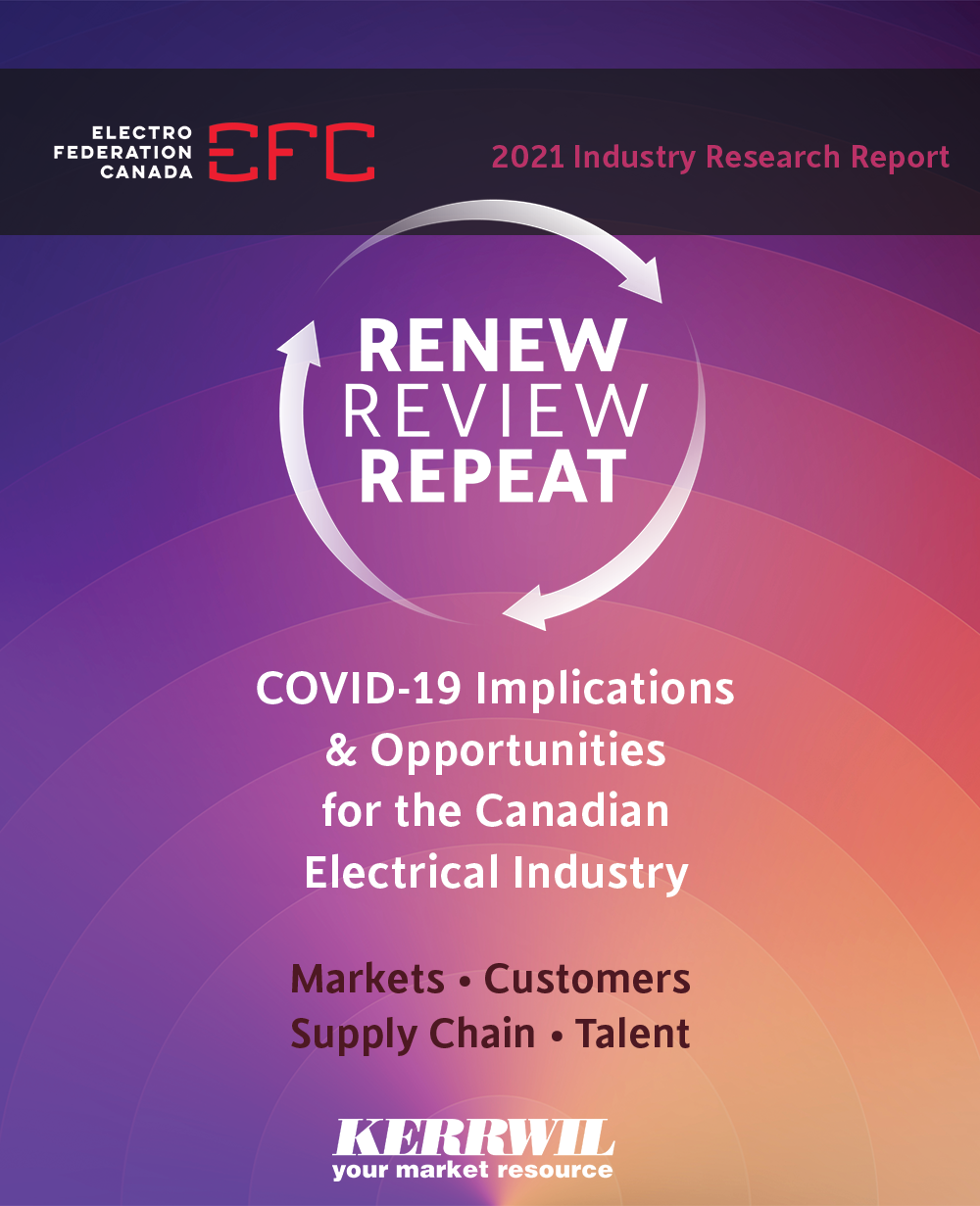
Business leaders everywhere are planning critical next steps as they prepare to emerge from the aftermath of the pandemic. This crisis has required leaders to renew strategies, review outcomes and repeat this cycle to emerge stronger on ‘the other side’ of the pandemic.
Download the Executive Summary | View Video Recording
Talent For An Emerging Workforce (EFC, 2020)

Through this research study, EFC is on a mission to demystify how the Electrical industry can streamline its talent availability gap so businesses can improve efficiencies, heighten customer experiences, and ultimately drive business growth.
This report draws out many important call-to-actions for members. Among them, is the need for our industry to elevate the role of Human Resources and empower this team with the skillsets required to strategize, shape and steer organizational development practices. The HR function is the key driver for talent management and must become a strategic partner in aligning talent requirements with organizational goals.
Electri-fyi: Exploring Electrification Trends and Opportunities in Canada (EFC, 2019)
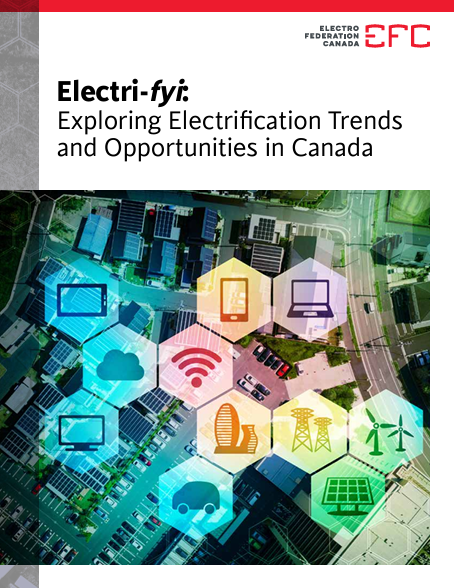
The Canadian electrical industry is facing a period of dynamic change that is creating a multitude of business challenges and opportunities. Complex and interconnected trends in the economic, technological, social, regulatory and environmental spheres are re-shaping how energy is generated, distributed, sold and used—ushering in an exciting new era of electrification.
The main objective of this whitepaper is to provoke reflection on what electrification means for your business: how it will affect your operation; the product and service opportunities that may arise; and how to adapt to stay competitive.
Digital Supply Chains in the Electrical Industry (EFC, 2018)
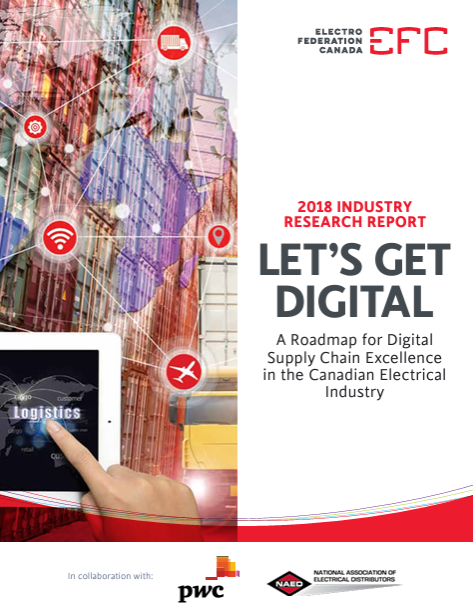
Unlocks the value-add of a digital supply chain within the Canadian electrical channel (manufacturers and distributors). During this presentation, you will learn what factors are generating interest in digitalization; what key opportunities businesses can expect to derive from a fully-integrated supply chain network; and how far along the electrical channel has progressed in digitalization today.
Sponsored by PwC and NAED
-
Rep of the Future (NEMRA, 2024)
The Rep of the Future study, the first in a series of NEMRA Insights, shares marketplace research gathered from manufacturer representatives, manufacturers and distributors. It is designed to give insight into what each member of the channel feels is needed for the manufacturer representative agency of the future to thrive.
Request a Copy (no cost for EFC Members)
Manufacturer of the Future Reports (NEMRA, 2024)
This important initiative gathered essential insights from manufacturers to better understand their perspectives on the market, the channel, and their needs. The study, conducted throughout the first part of 2024, involved in-depth interviews with over 30 manufacturers, providing valuable input on the key dynamics that will impact the manufacturer/manufacturer representative relationships in the coming years.
Canadian Green Retrofit Economy Study by CGBC
EFC Sponsored Research, 2022
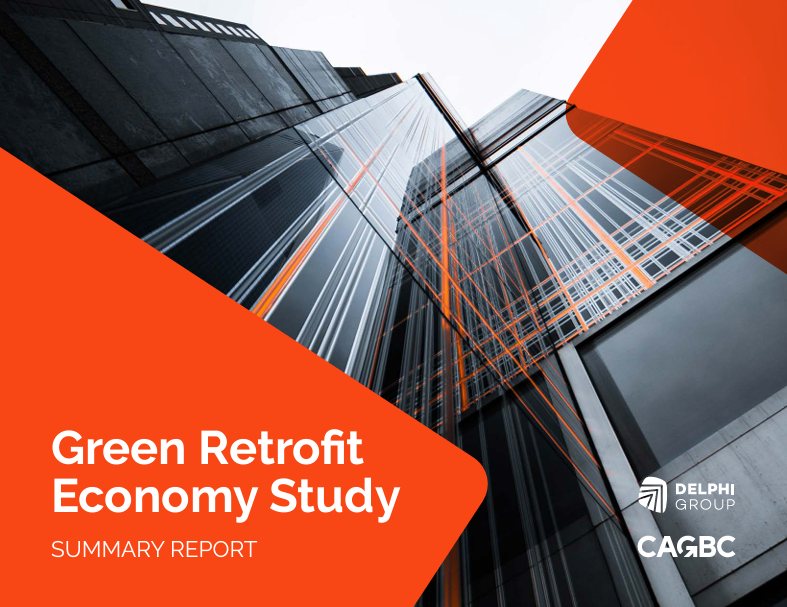 The Canada Green Building Council (CGBC) conducted a study profiling new pathways to accelerate GHG emission reduction targets through low-carbon, large building retrofits. This study will equip industry leaders with insights into the supply chain and workforce needs across Canada’s Part 3 retrofit economy by sharing provincial/regional supply and demand requirements for green technologies, materials, and products and emerging occupations, skills, and workforce needs.
The Canada Green Building Council (CGBC) conducted a study profiling new pathways to accelerate GHG emission reduction targets through low-carbon, large building retrofits. This study will equip industry leaders with insights into the supply chain and workforce needs across Canada’s Part 3 retrofit economy by sharing provincial/regional supply and demand requirements for green technologies, materials, and products and emerging occupations, skills, and workforce needs.Growth and Sustainability in the Face of the e-Commerce Uprising (NAED, 2018)
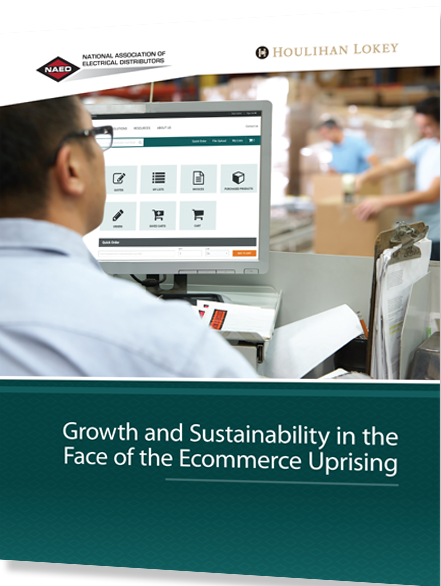 A study about how e-Commerce is challenging traditional electrical distribution practices featuring a case study of Amazon and suggestions for distributors to maintain successful practices.
A study about how e-Commerce is challenging traditional electrical distribution practices featuring a case study of Amazon and suggestions for distributors to maintain successful practices.Drugs and Alcohol in the Workplace: Preparing for the Legalization of Marijuana (e2r, 2018)
Employers across the country are concerned about the impact of the upcoming legalization of marijuana, and how they can manage it in a way that balances productivity, safety, and human rights obligations. In this webinar, Stuart Ducoffe, e2r, reviewed the current legal landscape and the upcoming change to legislation legalizing marijuana. He discussed practical concerns relating to impairment at work, drug and alcohol testing, navigating safety concerns, and the employer’s duty to accommodate. Finally, Stuart discussed best practices in developing a drugs and alcohol policy.
The Monetization of Intelligent Buildings (ASHB, 2018)
This report provides an overview of how to monetize intelligent buildings from the perspective of building owners, developers, solution providers (OEM manufacturers and service providers) and other stakeholders. This research includes stakeholder analysis, business opportunities, technical barriers and opportunities, future market direction, use-cases and industry recommendations.
Playbook of Deep Thinking Tools to Reimagine Distributor-Manufacturer Relationships (NAED, 2016/2018)
A playbook of activities to foster successful relationships among electrical distribution partners.
Learn more | Request a copy (no cost for EFC members)
-
Low-voltage DC Power Developments (EFC, 2017)
Examines emerging low-voltage (LV) power developments and explores the implications and opportunities that this new technology brings to the electrical industry.
Smart Energy Management Systems: Unlocking Opportunities for Growth (NAED, 2017)
This research explores the opportunities and strategies to take advantage of the growing smart energy management solutions in both commercial and residential sectors.
Learn more | Request a copy (no cost for EFC Members)
20/20 Vision: The Future of the Canadian Electrical Contractor (EFC, 2016)
The Canadian electrical industry has come to an important crossroad. The emergence of new technology, shifts in age demographics, volatile economic conditions and changing customer expectations have given rise to new challenges and opportunities within the industry. To address these changes, companies must think forward and explore some important factors: What will their business model look like 2020? Who will their primary customers be? This forward-thinking approach is critical for businesses today. After all, you need to have a vision of where you are going, to build a path to get there.
Leveraging Your Data (NAED, 2016)
Describes how members can best plan and execute big data projects to maximize sales, stock, logistics and customer satisfaction.
Learn more | Request a copy (no cost for EFC Members)
Developing an Agile Construction Partnership (NAED, 2016)
This report examines the use of agile procurement within an electrical manufacturing, distribution, and construction supply chain.
Learn more | Request a copy (no cost for EFC members)
Emerging Sales Forces (NAED, 2016)
An overview of various factors as well as signposts to gauge developments in the future of employment with a focus on sales and distributors’ markets.
Learn more | Request a copy (no cost for EFC members)
Click & Order: eCommerce Study (EFC, 2014)
Provides insight on trends and opportunities with online research and purchasing interests among Canadian electrical customers.
Alternate Channels (NAED, 2014)
Assesses the types of companies that pose the most serious threat to distributors as an alternative source of supply.
Request a copy (no cost for EFC members)

 This report provides an overview of how to monetize intelligent buildings from the perspective of building owners, developers, solution providers (OEM manufacturers and service providers) and other stakeholders. This research includes stakeholder analysis, business opportunities, technical barriers and opportunities, future market direction, use-cases and industry recommendations.
This report provides an overview of how to monetize intelligent buildings from the perspective of building owners, developers, solution providers (OEM manufacturers and service providers) and other stakeholders. This research includes stakeholder analysis, business opportunities, technical barriers and opportunities, future market direction, use-cases and industry recommendations.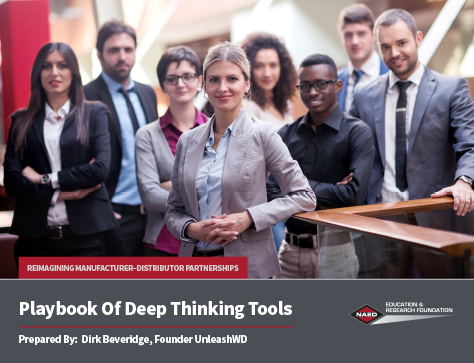 A playbook of activities to foster successful relationships among electrical distribution partners.
A playbook of activities to foster successful relationships among electrical distribution partners.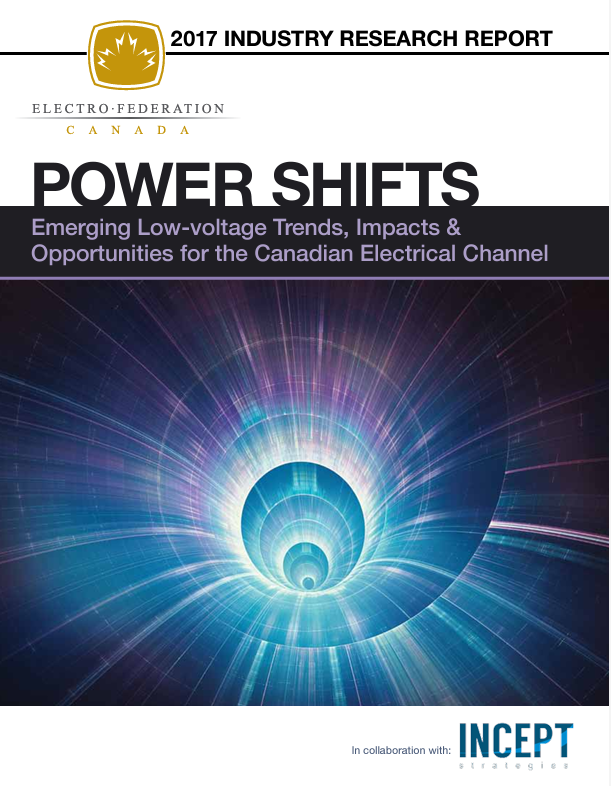 Examines emerging low-voltage (LV) power developments and explores the implications and opportunities that this new technology brings to the electrical industry.
Examines emerging low-voltage (LV) power developments and explores the implications and opportunities that this new technology brings to the electrical industry.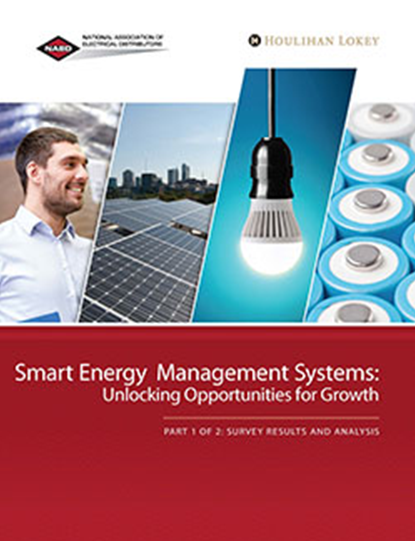 This research explores the opportunities and strategies to take advantage of the growing smart energy management solutions in both commercial and residential sectors.
This research explores the opportunities and strategies to take advantage of the growing smart energy management solutions in both commercial and residential sectors.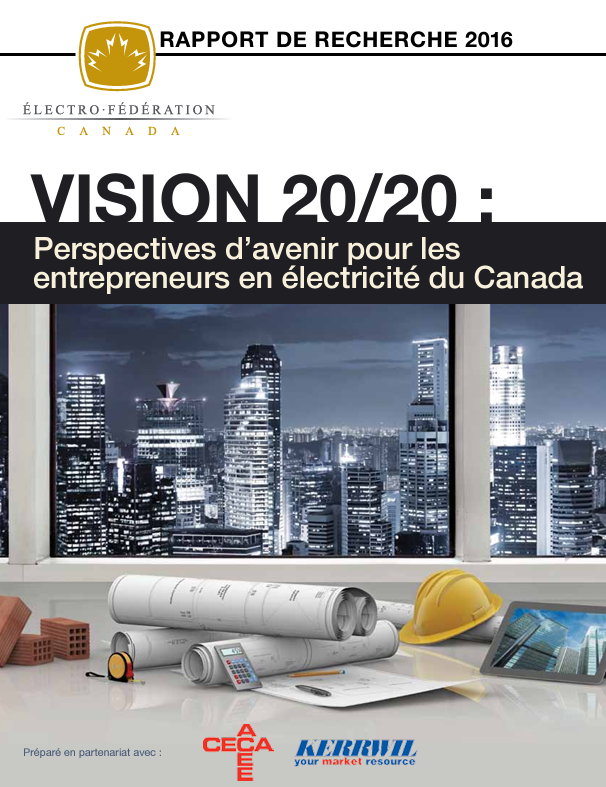 The Canadian electrical industry has come to an important crossroad. The emergence of new technology, shifts in age demographics, volatile economic conditions and changing customer expectations have given rise to new challenges and opportunities within the industry. To address these changes, companies must think forward and explore some important factors: What will their business model look like 2020? Who will their primary customers be? This forward-thinking approach is critical for businesses today. After all, you need to have a vision of where you are going, to build a path to get there.
The Canadian electrical industry has come to an important crossroad. The emergence of new technology, shifts in age demographics, volatile economic conditions and changing customer expectations have given rise to new challenges and opportunities within the industry. To address these changes, companies must think forward and explore some important factors: What will their business model look like 2020? Who will their primary customers be? This forward-thinking approach is critical for businesses today. After all, you need to have a vision of where you are going, to build a path to get there. Describes how members can best plan and execute big data projects to maximize sales, stock, logistics and customer satisfaction.
Describes how members can best plan and execute big data projects to maximize sales, stock, logistics and customer satisfaction.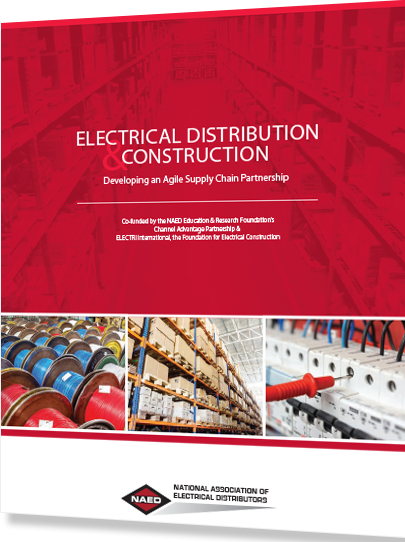 This report examines the use of agile procurement within an electrical manufacturing, distribution, and construction supply chain.
This report examines the use of agile procurement within an electrical manufacturing, distribution, and construction supply chain. An overview of various factors as well as signposts to gauge developments in the future of employment with a focus on sales and distributors’ markets.
An overview of various factors as well as signposts to gauge developments in the future of employment with a focus on sales and distributors’ markets. Provides insight on trends and opportunities with online research and purchasing interests among Canadian electrical customers.
Provides insight on trends and opportunities with online research and purchasing interests among Canadian electrical customers.